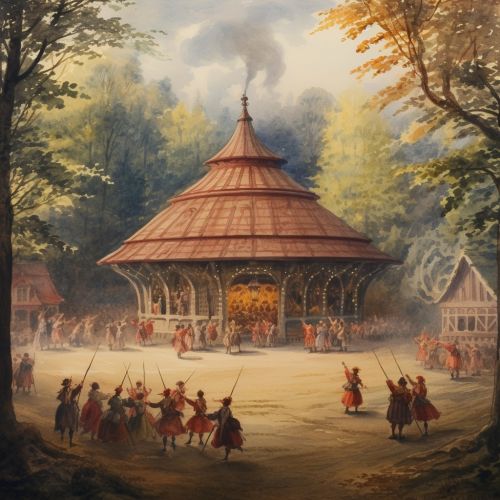Shakespeare
Early Life
William Shakespeare was born in 1564 in the small town of Stratford-upon-Avon, Warwickshire, England. His father, John Shakespeare, was a successful glove maker and local politician, while his mother, Mary Arden, was the daughter of a wealthy landowner. Shakespeare was the third of eight children and the eldest surviving son. He likely attended the King's New School in Stratford, a free grammar school where he would have studied Latin and the classics, providing him with a solid foundation for his future works.
Career
Shakespeare began his career as an actor and writer in London in the late 1580s. By 1592, he had achieved success with plays such as "Henry VI" and "Richard III". He was a member of the Lord Chamberlain's Men, a company of actors, later known as the King's Men. Shakespeare's plays were performed at the Globe Theatre, a playhouse built by the company in 1599.
Shakespeare's works can be divided into three main periods. The first, from 1590 to 1600, is known as his early period. It includes his histories and comedies, such as "A Midsummer Night's Dream", "Much Ado About Nothing", and "The Merchant of Venice". The second period, from 1600 to 1608, is considered his mature period, featuring his most celebrated tragedies, including "Hamlet", "Othello", "Macbeth", and "King Lear". The final period, from 1608 to 1613, is known as his late period, during which he wrote tragicomedies, also known as romances, such as "The Winter's Tale" and "The Tempest".
Shakespeare's plays are renowned for their exploration of human nature, their poetic language, and their deep understanding of the human condition. His sonnets, a collection of 154 poems, are also highly regarded for their exploration of themes such as love, beauty, time, and mortality.


Influence and Legacy
Shakespeare's influence on English language and literature cannot be overstated. He is credited with introducing thousands of words and phrases into the English language. His plays and sonnets have been translated into every major language and are performed more often than those of any other playwright. His works have been studied, analyzed, and interpreted in numerous ways, contributing to a vast body of literary criticism.
Shakespeare's legacy extends beyond literature. His works have influenced numerous other fields, including psychology, sociology, and philosophy. His plays have been adapted into countless films, television series, and theatrical productions. His life and works continue to be the subject of scholarly study and cultural reference.
Death and Posthumous Recognition
Shakespeare retired to Stratford around 1613, where he lived until his death on April 23, 1616. His cause of death remains unknown. He was buried in the chancel of the Holy Trinity Church in Stratford. His gravestone bears an epitaph which he is said to have written himself, warning against disturbing his grave.
In the centuries following his death, Shakespeare's works have been continually celebrated. In the 18th century, he was idolized by the Romantics for his creativity and genius. In the 19th century, his works were widely studied and performed, a trend that continues to this day. In the 20th century, new movements in scholarship and performance have explored his works in various contexts, further cementing his reputation as one of the greatest writers in the English language.
